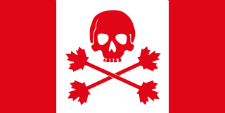 In recent years pirate sites have been blocked around the world, from Europe, through Asia, and even Down Under.
In recent years pirate sites have been blocked around the world, from Europe, through Asia, and even Down Under.
While many of the large corporations backing these blockades have their roots in North America, blocking efforts have been noticeably absent there. This should change, according to a new anti-piracy coalition that was launched in Canada this week.
Fairplay Canada, which consists of a broad range of organizations with ties to the entertainment industry, calls on the local telecom regulator CRTC to institute a national website blocking program.
The coalition’s members include Bell, Cineplex, Directors Guild of Canada, Maple Leaf Sports and Entertainment, Movie Theatre Association of Canada, and Rogers Media, which all share the goal of addressing the country’s rampant piracy problem.
The Canadian blocklist should be maintained by a yet to be established non-profit organization called “Independent Piracy Review Agency” (IPRA) and both IPRA and the CRTC would be overseen by the Federal Court of Appeal, the organizations propose.
“What we are proposing has been effective in countries like the UK, France, and Australia,” says Dr. Shan Chandrasekar, President and CEO of Asian Television Network International Limited (ATN), who is filing Fairplay Canada’s application.
“We are ardent supporters of this incredible coalition that has been formed to propose a new tool to empower the CRTC to address online piracy in Canada. We have great faith in Canadian regulators to modernize the tools available to help creators protect the content they make for Canadians’ enjoyment.”
The proposal is unique in the sense that it’s the first of its kind in North America and also has support from major players in the Telco industry. Since most large ISPs also have ties to media companies of their own, the latter is less surprising as it may seem at first glance.
Bell, for example, is not only the largest Internet provider in Canada but also owns the television broadcasting and production company Bell Media, which applauds the new plan.
“Bell is pleased to work with our partners across the industry and the CRTC on this important step in ensuring the long-term viability of the Canadian creative sector,” says Randy Lennox, President of Bell Media.
“Digital rights holders need up-to-date tools to combat piracy where it’s happening, on the Internet, and the process proposed by the coalition will provide just that, fairly, openly and effectively,” he adds.
Thus far the Government’s response to the plan has been rather reserved. When an early version of the plans leaked last month, Canadaland quoted a spokesperson who said that the Government is committed to opening doors instead of building walls.
Digital rights group OpenMedia goes a step further and brands the proposal a censorship plan which will violate net neutrality and limit people’s right to freedom of expression.
“Everybody agrees that content creators deserved to be paid for their work. But the proposal from this censorship coalition goes too far,” Executive Director Laura Tribe says.
“FairPlay Canada’s proposal is like using a machine gun to kill a mosquito. It will undoubtedly lead to legitimate content and speech being censored online violating our right to free expression and the principles of net neutrality, which the federal government has consistently pledged support for.”
While CTRC is reviewing FairPlay Canada’s plans, OpenMedia has launched a petition to stop the effort in its tracks, which has been signed by more than 45,000 Canadians to date.





